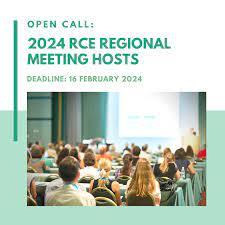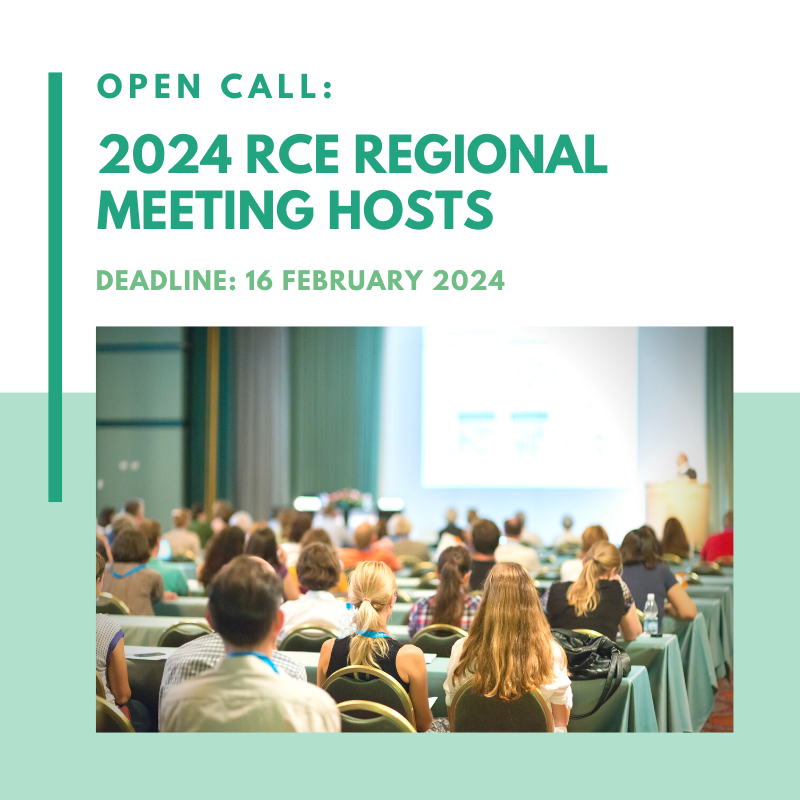
https://www.rcenetwork.org/portal/open-call-host-rce-regional-meetings-2024
OPEN CALL TO HOST RCE REGIONAL MEETINGS IN 2024
Submitted by Anonymous (not verified) on Fri, 2023-11-10 13:18
 The Global RCE Service Centre is excited to announce an open call to host RCE Regional Meetings in 2024.
The Global RCE Service Centre is excited to announce an open call to host RCE Regional Meetings in 2024.
Applications are being accepted to host the following events:
- 16th Asia-Pacific Regional Meeting
- 14th African Regional Meeting
- 13th Americas Regional Meeting
- Europe Regional Meeting 2024
The Global RCE Network is guided by principles of open communication, fair play, the sharing of ideas and support of each other. The opportunity to meet and connect, either face-to-face or virtually, provides benefits to grow together as a whole RCE community.
Cross-cultural, interdisciplinary and multi-stakeholder networking creates opportunities for brainstorming, piloting and up-scaling policies for integrating sustainability thinking into all aspects of society. Our ideas, projects and collaborations are what is needed, as is our capacity as a network. It strengthens the interface between science, policy and society, thereby linking education and development.
The Regional RCE Meetings in Asia-Pacific, Africa, the Americas, and Europe continue to be important mechanisms to create synergies within the network and to monitor and evaluate RCEs' progress at the regional level. These events provide a platform for discussion, networking, the sharing of knowledge, and learning.
Please note that the Global RCE Conference is held biannually. The next call for hosting the 14th Global RCE Conference (scheduled for 2025) is planned to be announced in late 2024.
WHO CAN APPLY TO HOST?
RCEs in the Global RCE Network that are interested in hosting a Regional Meeting are encouraged to apply. RCEs may host the Meeting as individual RCEs or work with other RCEs as joint hosts. Because RCEs are multi-stakeholder networks, participation from different actors (organisations and individuals) within the RCE is critical in hosting duties.
Applicants are encouraged to research any global, regional, or local ESD/SD conferences or other activities that are within their geographic area which may be synergistic with RCE activities when proposing a date and venue. The Global RCE Service Centre will gladly work with the selected RCE(s) on designing a conference programme and coordinating a timeline, as well as promoting events via the UNU-IAS channels. Please note, however, the meeting host is requested to cover the organisational costs.
DATES:
The suggested timeframes for holding the Regional Meetings in 2024 are the following:
Regional Meetings: 1 June 2024 – 31 October 2024
TO APPLY:
Please complete the Proposal to Host RCE Event 2024 Form, to be submitted with an official letter of interest, a tentative programme, budget sheet, and any other supporting documents (optional), to the Global RCE Service Centre at RCEServiceCentre@unu.edu by Friday 16 February 2024 (12:00pm noon JST).
For reference, the following information is requested in the proposal form:
- Proposed dates (usually 2-3 days)
- Proposed modality (in-person, hybrid or online)
- Proposed theme or thematic areas for the meeting
- Relevance of the theme to the region
- Objectives
- Expected outputs
- Location and capacity of proposed venue
- Accessibility of the proposed venue and accommodation
- Timeline showing preparation of the proposed meeting
- Tentative sources of funding and proposed budget outline
- Contact person(s) with relevant assigned tasks and/or responsibilities
- Any events that will be held back-to-back with the meeting
- Visa requirement reference (for meeting participants) e.g. URL for a website of your country's department of immigration
Please note that following the submission deadline, the Global RCE Service Centre will conduct interviews with host candidates to aid in the selection process.
For any questions, please do not hesitate to contact the Global RCE Service Centre at RCEServiceCentre@unu.edu.
RCE VISION AND MISSION
In 2002, the UN General Assembly adopted a resolution announcing the Decade of Education for Sustainable Development (UNDESD 2005-2014), based on the Johannesburg Plan of Implementation. The United Nations Scientific and Cultural Organization (UNESCO), the lead agency for the UNDESD, stressed the need to reorient existing education towards sustainability.
In 2003, in response to the UN resolution on the UNDESD, the United Nations University Institute for the Advanced Study of Sustainability (UNU-IAS) launched the ESD project, with funding support from the Ministry of the Environment, Japan. The ESD project designs and implements research and development activities through two flagship initiatives: a global multi-stakeholder network of Regional Centres of Expertise on ESD (RCEs) and a network of higher education institutions called the Promotion of Sustainability in Postgraduate Education and Research Network (ProSPER.Net).
Moving forward, UNESCO has now presented the ESD for 2030 Roadmap with its five priority areas of action: advancing policy, transforming learning environments, building capacities of educators, empowering and mobilizing youth, and accelerating local level actions. At all levels of society, RCEs play a crucial role in implementing these goals using their local knowledge and global network.
As of August 2023, 190 RCEs have officially been acknowledged by the United Nations University worldwide. The Global RCE Service Centre is headquartered at UNU-IAS, where it provides assistance to individual RCEs and facilitates their communication and networking.
RCE Vision
RCEs aspire to translate global objectives into the context of the local communities in which they operate. Upon the completion of the DESD in 2014, RCEs are committed to further generating, accelerating and mainstreaming ESD by implementing the ESD for 2030 Roadmap, and contributing to the realization of the Sustainable Development Goals (SDGs).
RCE Mission
The planet faces a number of sustainability challenges, from climate change and the rapid extinction of species to the necessary modification of our consumption patterns. International platforms exist to tackle each of these issues: the United Nations Framework Convention on Climate Change (UNFCCC) mission is to reduce greenhouse gas emissions globally, keeping in mind action need to happen at the local level; the 10 Year Framework Programme on Sustainable Consumption and Production (10YFP on SCP) which is examining ways how consumer behaviour and industrial production patterns can shift towards a more sustainable use of the planet’s resources; and the Convention on Biological Diversity (CBD) as well as the Intergovernmental Platform on Biodiversity and Ecosystem Services (IPBES), both platforms bring scientists and policy makers together in a mission to protect the world’s biota.
Each of these global platforms needs to be implemented at a local level. With their official links to UN agencies, formal education institutions, and informal educators worldwide, RCEs are in an ideal position to do just that. The Global RCE Network brings together multi-sectoral and interdisciplinary members who might not usually work together. As such, they are uniquely placed to help create solutions to sustainability challenges through dialogue, education and learning. They are highly influential policy advocates, able to test policies individually and work collectively to bring policy to scale and advice on future actions.
Through these efforts, RCEs help prepare local leaders of tomorrow with the tools and information they need to make smart and sustainable choices for the future. RCE efforts encourage innovation and new approaches to sustainable development. They translate existing knowledge into concrete actions and empower individuals to make sustainable choices for themselves and their communities.
The success each RCE achieves on the local level is brought to scale through the Global RCE Network worldwide. Local knowledge, expertise, and best practices are shared globally through the network and can be adapted and applied successfully in other regions. RCEs also play a central role in the transfer of global technologies, knowledge, and experiences at the local level through their programmes and activities.









